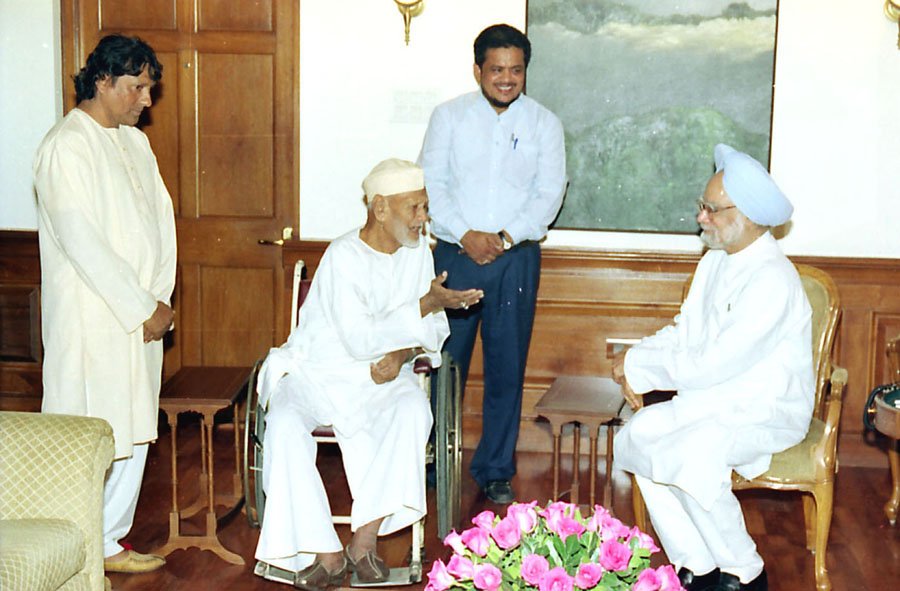
Ustad Bismillah Khan was a legendary musician who elevated the shehnai from a mere folk instrument to one of India’s most revered classical instruments. His name is synonymous with Indian classical music, and his contributions earned him the highest civilian honors in the country, including the Bharat Ratna. Born on March 21, 1916, in Dumraon, Bihar, Bismillah Khan belonged to a family of musicians. His father, grandfather, and great-grandfather were all court musicians in the princely state of Bhojpur. He showed an early interest in the shehnai and received rigorous training from his uncle, Ali Bux, who was a shehnai player at the Kashi Vishwanath Temple in Varanasi. From an early age, he immersed himself in music, practicing for hours on the ghats of the Ganges, letting the melodies of his shehnai blend with the divine atmosphere of the holy city.
Bismillah Khan’s devotion to the shehnai led him to introduce it to the Indian classical music stage. Before him, the instrument was primarily used during weddings and temple ceremonies. His breakthrough came in 1937 when he performed at the All India Music Conference in Kolkata, mesmerizing the audience with the sheer magic of his shehnai. However, his most iconic moment came on August 15, 1947, when he played the shehnai from the Red Fort as India celebrated its first Independence Day. His rendition of “Raga Kafi” became an unforgettable part of India’s history, marking the dawn of freedom with a melody that touched the soul of the nation. This performance not only solidified his legacy but also ensured that the shehnai would forever be associated with moments of national pride and celebration.
His dedication and contribution to music earned him numerous prestigious awards, including the Bharat Ratna in 2001, making him one of the few musicians to receive India’s highest civilian honor. He was also the recipient of the Padma Vibhushan, Padma Bhushan, and Padma Shri, among several other accolades. Despite achieving global fame and being invited to perform worldwide, Bismillah Khan remained deeply rooted in his love for Varanasi. He often turned down lucrative offers to settle abroad, famously stating, “Benares is my soul, and the Ganga is my mother.” His connection to the city and its spiritual essence was so strong that he believed his music was incomplete without its presence.
Even after his passing in 2006, Ustad Bismillah Khan’s influence continues to inspire musicians worldwide. His contribution to Indian classical music ensured that the shehnai found its place on global platforms. His life was a testament to passion, dedication, and the power of music. Through his artistry, he immortalized the shehnai, transforming it into an instrument of profound beauty and deep emotion. Today, his melodies still echo in the hearts of music lovers, a reminder of India’s rich cultural heritage and the magic of classical music.
Early Life and Musical Journey
Born on March 21, 1916, in Dumraon, Bihar, Bismillah Khan belonged to a family of musicians. His father, grandfather, and great-grandfather were all court musicians in the princely state of Bhojpur. He showed an early interest in the shehnai and received rigorous training from his uncle, Ali Bux, who was a shehnai player at the Kashi Vishwanath Temple in Varanasi.
At birth, he was named Qamruddin, in harmony with his elder brother Shamsuddin. However, when his grandfather, Rasool Bux Khan—himself a renowned shehnai player—saw the newborn, he joyfully exclaimed, “Bismillah!” (meaning “In the name of Allah”), and from then on, he was affectionately known as Bismillah Khan.
At just three years old, young Bismillah moved to Varanasi, Uttar Pradesh, where he was trained by his maternal uncle, Ali Bux ‘Vilayatu’ Khan, a shehnai maestro attached to the Kashi Vishwanath Temple. Under his uncle’s guidance, he immersed himself in rigorous practice, often perfecting his craft on the banks of the river Ganga—a routine that became an integral part of his life.
His big break came in 1937, when he performed at the All India Music Conference in Kolkata. This performance was a turning point, bringing the shehnai into the spotlight as a respected classical instrument. From there, his journey was nothing short of extraordinary.
Over the years, he mesmerized audiences worldwide, performing in Afghanistan, the USA, Canada, Bangladesh, Iran, Iraq, West Africa, Japan, Hong Kong, and across Europe. His music transcended borders, and he played at prestigious events like the World Exposition in Montreal, Cannes Art Festival, and Osaka Trade Fair.
Rise to Fame
Bismillah Khan’s devotion to the shehnai led him to introduce it to the Indian classical music stage. Before him, the instrument was primarily used during weddings and temple ceremonies. His performances at the All India Music Conference in 1937 and at India’s Independence Day ceremony in 1947 made the shehnai a respected concert instrument. His soulful rendition of “Raga Kafi” on August 15, 1947, from the Red Fort remains one of the most iconic musical moments in Indian history.
Awards and Recognition
Ustad Bismillah Khan was honored with numerous prestigious awards, including:
- Bharat Ratna (2001) – India’s highest civilian award
- Padma Vibhushan (1980)
- Padma Bhushan (1968)
- Padma Shri (1961)
- Tansen Award
His dedication to his craft and humility made him a beloved figure in Indian classical music.
Love for Varanasi and Shehnai
Despite international fame, Bismillah Khan remained deeply attached to Varanasi and the Ganges. He declined offers to settle abroad, saying, “Benares is my soul, and the Ganga is my mother.” His love for his shehnai was unparalleled, considering it not just an instrument but a divine medium of music.
Legacy
Even after his passing in 2006, Ustad Bismillah Khan’s influence continues to inspire musicians worldwide. His contribution to Indian classical music ensured that the shehnai found its place on global platforms. His life was a testament to passion, dedication, and the power of music.
Bismillah Khan’s shehnai still echoes in the hearts of music lovers, a reminder of India’s rich cultural heritage and the magic of classical melodies.